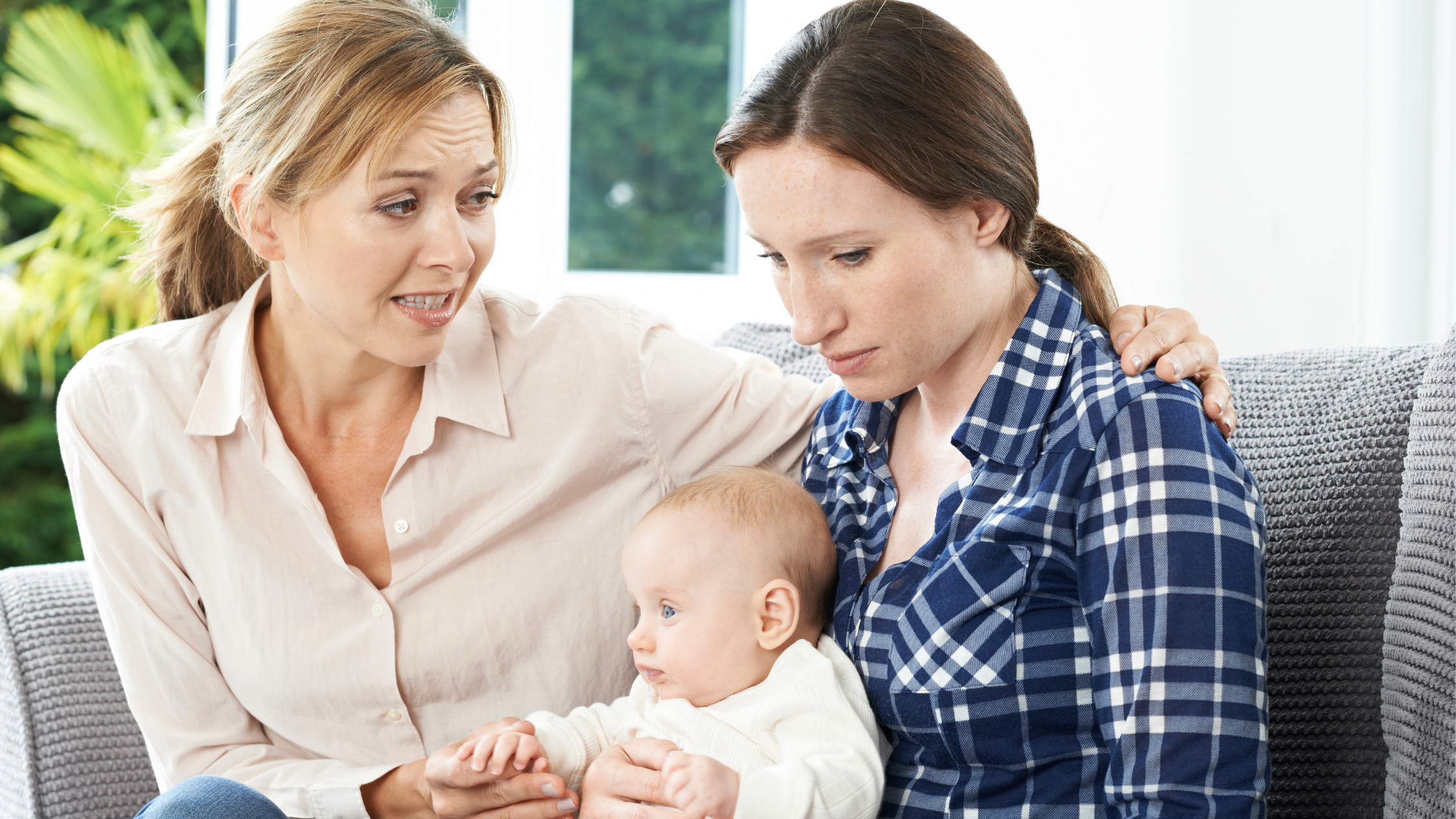Coping With Anxiety After Pregnancy

Before and after giving birth can be a highly distressing period for a woman. Within this time frame, also called the perinatal stage, she'll have to undergo several changes to test her mental and psychological resilience.
That said, mental health issues should be addressed proactively. Receiving perinatal mental health support is extremely important because it can impact the mother and child's lives and even those around them. The perinatal period refers to one year before and up to two years after a child's birth. (1)
Moreover, research has discovered that up to 21% of American women develop an anxiety disorder during the perinatal and postpartum stages. Another study found that 75% of those who develop postpartum anxiety also showed signs of depression. (2)
It can be easy to overlook anxiety in pregnancy. If left unaddressed, the issue may later lead to severe mental health issues. Thus, an expectant or new mother must know how to develop coping mechanisms for anxiety. Learning about anxiety is a good start. In this blog, you'll discover what anxiety is, its symptoms and how to cope.
Understanding Perinatal Anxiety
Anxiety is defined as excessive feelings of nervousness, worry or fear. This condition often affects the brain and the person's physiological processes. It interferes with their normal functions.
Besides interrupting a person's disposition and daily activities, perinatal anxiety can also impact mother and child communication. Experts stress the importance of the perinatal stage, where parent-infant bonding must be strengthened to reduce the risks of neurodevelopmental dysfunction. Research has suggested that up to 10.5% of women develop anxiety during pregnancy, and another 10.8% may have it postpartum or after childbirth. (1) (3)
Because a woman may experience distress at any stage of childbirth, experts often use the umbrella term perinatal or postpartum mood and anxiety disorder or PMAD. Perinatal anxiety can range from mild to severe. Thus, if you think you or someone you know might have it, visit website and read on for suggestions on how to cope or seek professional help. (4)
.png?width=2240&name=BLOG%20IMAGE%20(78).png)
Symptoms
While it's normal for expectant or new mothers to experience fear and worry about their child, persons with perinatal anxiety will have recurrent, illogical, uncontrollable and highly disrupting thoughts or worries. They may have severe concerns about the infant's or their family's health or death, a sense of doom and irrational fears about anything and everything. (3)
Physically, anxiety may manifest through the following:
- exhaustion
- heart palpitations
- sleeping troubles
- hyperventilation
- nausea
- irritability
- obsessive thoughts
- feeling restless and panicky
- muscle tension(s)
- excessive sweating
(2) (3)
How Long Do These Symptoms Last?
Excessive anxiety may last for at least six months in general anxiety disorders. There's no timeframe set for pregnancy-induced anxiety. Some researchers suggest a woman who experiences the aforementioned symptoms for at least one month may likely have the condition. Perinatal anxiety typically manifests up to three months following childbirth but can also happen at any time during the perinatal stage. (2) (4)

How to Cope with Anxiety After Pregnancy
Several reasons contribute to anxiety in an expectant mother. Carrying a child will cause physical changes in a woman, affecting her in many ways and disrupting her hormones, causing mood swings. Moreover, caring for a child may physically drain a mother as she spends sleepless nights breastfeeding, changing diapers, and many other things. If this continues and the woman doesn't get the support she needs, it may lead to more severe health issues. (2)
Below are some of the ways you can cope with perinatal anxiety.
- Practice self-care
Self-care is key to preventing postpartum distress from developing perinatal anxiety and its more severe forms. Relaxation techniques can help reduce feelings of distress. However, people have different ways of taking care of themselves. Some do it by exercising, enjoying music, keeping a journal, and getting some fresh air and sunshine. Of these options, exercise, particularly resistance training, is the best option for reducing anxiety symptoms.
More importantly, always remember to take some rest, eat a healthy diet and get high-quality sleep. Have someone help you take care of the child as you focus on yourself and empower yourself as a new mother. Don't feel guilty, and take some naps when your baby is asleep. (5)(6)(7)
- Mindfulness training
Mindfulness training is based on mindfulness meditation, which trains you to be more aware of your present thoughts, emotions and sensations. It helps eliminate negative thoughts and obsessive worries and tries to calm you down. There are a few ways to practice mindful meditation, but it always involves deep breathing and concentration.
When used in persons with perinatal anxiety, mindfulness–driven cognitive therapy was said to reduce feelings of depression, anxiety and worry. The study also discovered that 94% of women with generalised anxiety disorder no longer met the diagnostic criteria after having such training. (3)
- Learn some breathing exercises
Research shows that improper breathing can disrupt the supply of carbon dioxide and oxygen in the body, affecting emotional processes and even contributing to fatigue, anxiety, and panic attacks. Breathing exercises are often used to counter this. Controlling your breathing can help you relax and get rid of the sensations that may cause anxiety. There are several breathing techniques to manage feelings of panic and distress, including perinatal anxiety. (8)
Techniques such as 4-7-8 breathing can serve as the nervous system's natural relaxant. According to the American Institute of Stress, performing belly or abdominal breathing helps reduce stress and anxiety. (8)
- Link with a support group or new mums
A sense of belongingness may help dissipate perinatal anxiety. Joining online communities for new mothers means you can learn from them and share your positive and negative feelings and experiences, including milestones, frustrations, disappointment and many others. Knowing that you're not alone in your journey can be a huge relief, particularly to new moms. (7)
- Make time for family members and friends
Don't cut your ties with the people who matter. Maintain or strengthen your connections with family members and friends who can physically, mentally and emotionally support you. A person can't discount the power of positive support from people they can always rely upon without being judged. Thus, a robust support system may help dissipate your excessive feelings of fear or worry with regular communication. (7)
- Ask help from family and friends
First of all, don't push yourself too much. Having a new baby requires your time and attention, so accept that you can't do everything you're supposed to do. If you're struggling to keep everything in order, you must ask family members and friends for help. (7)
Ask your spouse, mother and mother-in-law to help you take care of the baby. If your children are old enough to do household chores by themselves, assign them tasks like cleaning the house or putting the baby to sleep.
.png?width=2240&name=BLOG%20IMAGE%20(77).png)
When to Seek Professional Help
Perinatal anxiety should disappear after a few months following childbirth and following some of the techniques above. However, if the negative thoughts and feelings persist, it may be a sign that you need professional help. If left unaddressed, it can turn into a more serious condition called postpartum depression, which can significantly impact the woman's ability to function. Seek an appointment with a mental health professional immediately.
Conclusion
Generally speaking, most women may experience being overwhelmed during pregnancy and a few weeks after childbirth. Only by learning how to tackle these issues and receiving support can she enjoy the entire child-rearing experience.
Self-care, acceptance and social support are keys to addressing perinatal anxiety and other mental and emotional instability feelings. When these elements come together, a woman achieves resiliency and security.
References
- "The perinatal period, a window of opportunity got enhancing parent-infant communication: an approach to prevention", Source: https://pubmed.ncbi.nlm.nih.gov/3322517/
- "What to know about postpartum anxiety", Source: https://www.medicalnewstoday.com/articles/postpartum-anxiety
- "Perinatal Generalised Anxiety Disorder: Assessment and Treatment", Source: https://www.ncbi.nlm.nih.gov/pmc/articles/PMC4589308/
- "Perinatal Mood And Anxiety Disorders", Source: https://www.med.unc.edu/psych/wmd/resources/mood-disorders/perinatal/#md_postpartum_anx
- "What You Need to Know About Postpartum Anxiety", Source: https://www.healthline.com/health/pregnancy/postpartum-anxiety
- "Postnatal depression and perinatal mental health", Source: https://www.mind.org.uk/information-support/types-of-mental-health-problems/postnatal-depression-and-perinatal-mental-health/perinatal-anxiety/
- "Depression and Anxiety During Pregnancy and After Birth: FAQs", Source: https://www.healthychildren.org/English/ages-stages/prenatal/Pages/Depression-and-Anxiety-During-Pregnancy-and-After-Birth-FAQs.aspx
- "8 Deep Breathing Exercises for Anxiety", Source: https://www.verywellmind.com/abdominal-breathing-2584115



